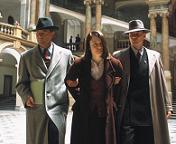 I’d never heard of Sophie Scholl until last week, a fact I am embarrassed to admit, especially now that I’ve seen “Sophie Scholl: The Final Days,” an Academy Award nominee for Best Foreign Language Film. Scholl is today a national hero in Germany for her resistance efforts against the Nazis, and her trial and execution for distributing leaflets at a Munich university. Hopefully, the movie will make her equally well known in the U.S.
I’d never heard of Sophie Scholl until last week, a fact I am embarrassed to admit, especially now that I’ve seen “Sophie Scholl: The Final Days,” an Academy Award nominee for Best Foreign Language Film. Scholl is today a national hero in Germany for her resistance efforts against the Nazis, and her trial and execution for distributing leaflets at a Munich university. Hopefully, the movie will make her equally well known in the U.S.
In Scholl’s story, a few individuals do what little they can to oppose the evil that engulfed their nation. Members of a group called The White Rose, these young Germans are not the usual resistance fighters on which filmmakers love to focus; they’re not warriors taking up arms, nor are they Oscar Schindler types who save large numbers of Jews through ingenious planning. The story of Sophie Scholl is much simpler, much smaller than that–and in that simplicity lies the understated power of this film (which is, fittingly, much smaller in scope and more modest in sweep than a movie like “Schindler’s List”). Scholl and her brother Hans are caught distributing anti-Nazi leaflets on a university campus. The Scholls and their comrades are not larger-than-life heroes whose bravery and accomplishments are virtually impossible to relate to. Instead, they are us, everyday people, albeit caught in an impossible situation. Sophie, only 21 years old, is engaged to a man fighting for Germany in the Nazi army; she tells her cellmate that her fiance is loyal to his oath to Hitler. Her brother is a medical student. Yet faced with the oppression of the Nazi regime and the mounting casualties of a unjust and unwinnable war, they did what little they could: Through leaflets and grafitti, they urged widespread resistance. It wasn’t going to end the war, and perhaps it was naive of them to think they could make a real difference, but with their world out of control, they took a small step toward righting the wrongs around them.
The film follows Sophie’s interrogation, as she at first denies any involvement and keeps repeating that she and Hans are apolitical. The next day, faced with strong evidence of her “guilt,” she neither maintains the charade that she is innocent nor turns into some sort of fiery orator denouncing her captors. She speaks her truth quietly but assertively, by admitting what she did–and saying she is proud of it and would do it again. She looks her interrogator in the eye and is unafraid to denounce Hitler and his followers. At the trial, her voice grows even stronger, as she defends her actions and tells the judge: “You will soon be standing where we are now.”
The film makes clear where Sophie and her brother got their strength and their conviction. Their father, a former mayor, had been jailed the previous year for calling Hitler “God’s scourge to mankind.” He shows up at his children’s show trial, and before being kicked out, he uses his split second not to beg for mercy from the unmerciful judge but to remind the court, “There is a higher justice.” And in the couple of minutes Sophie is granted to say goodbye to her parents, her father tells her he is proud, adding, “You did the right thing.” It was one of the movie’s strongest moments.
“Sophie Scholl: The Final Days” just opened in New York, will open Friday in L.A., and will go wider in the coming weeks. The film itself is a bit formulaic–I could have done without the pulsating “suspense” music foreshadowing Sophie’s arrest, for instance–and the translation can be overly formal, but despite its flaws, it’s still powerful and moving. Just before she is led away to her death, Sophie, a committed Lutheran, looks up and sees a crucifix on the wall, the suffering Jesus still on the cross. It is a stark reminder that our faith, whatever it is, calls us to fix this broken world in whatever way we can. I am glad to now know how Sophie Scholl tried to fix her world.


